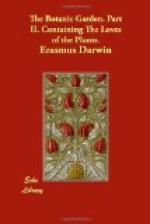P. I suppose the latter consists of Distress attended with Pity, which is said to be allied to Love, the most agreeable of all our passions; and the former in Distress, accompanied with Disgust, which is allied to Hate, and is one of our most disagreeable sensations. Hence, when horrid scenes of cruelty are represented in pictures, we wish to disbelieve their existence, and voluntarily exert ourselves to escape from the deception: whereas the bitter cup of true Tragedy is mingled with some sweet consolatory drops, which endear our tears, and we continue to contemplate the interesting delusion with a delight which it is not easy to explain.
B. Has not this been explained by Lucretius, where he describes a shipwreck; and says, the Spectators receive pleasure from feeling themselves safe on land? and by Akenside, in his beautiful poem on the Pleasures of Imagination, who ascribes it to our finding objects for the due exertion of our passions?
P. We must not confound our sensations at the contemplation of real misery with those which we experience at the scenical representations of tragedy. The spectators of a shipwreck may be attracted by the dignity and novelty of the object; and from these may be said to receive pleasure; but not from the distress of the sufferers. An ingenious writer, who has criticised this dialogue in the English Review for August, 1789, adds, that one great source of our pleasure from scenical distress arises from our, at the same time, generally contemplating one of the noblest objects of nature, that of Virtue triumphant over every difficulty and oppression, or supporting its votary under every suffering: or, where this does not occur, that our minds are relieved by the justice of some signal punishment awaiting the delinquent. But, besides this, at the exhibition of a good tragedy, we are not only amused by the dignity, and novelty, and beauty, of the objects before us; but, if any distressful circumstances occur too forcible for our sensibility, we can voluntarily exert ourselves, and recollect, that the scenery is not real: and thus not only the pain, which we had received from the apparent distress, is lessened, but a new source of pleasure is opened to us, similar to that which we frequently have felt on awaking from a distressful dream; we are glad that it is not true. We are at the same time unwilling to relinquish the pleasure which we receive from the other interesting circumstances of the drama; and on that account quickly permit ourselves to relapse into the delusion; and thus alternately believe and disbelieve, almost every moment, the existence of the objects represented before us.
B. Have those two sovereigns of poetic land, HOMER and SHAKESPEAR, kept their works entirely free from the Horrid?—or even yourself in your third Canto?
P. The descriptions of the mangled carcasses of the companions of Ulysses, in the cave of Polypheme, is in this respect certainly objectionable, as is well observed by Scaliger. And in the play of Titus Andronicus, if that was written by Shakespear (which from its internal evidence I think very improbable), there are many horrid and disgustful circumstances. The following Canto is submitted to the candour of the critical reader, to whose opinion I shall submit in silence.




